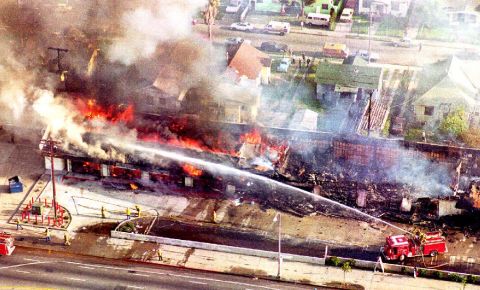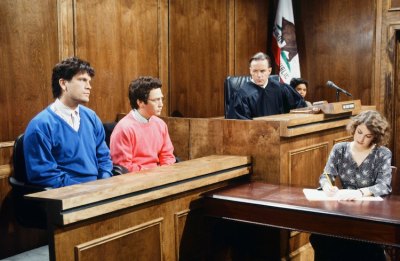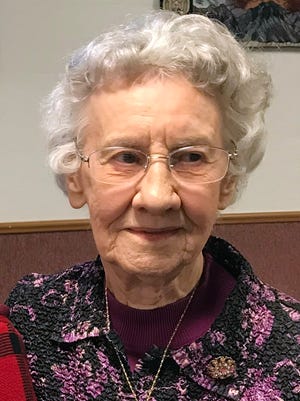 II: Men II Boyz: “Aunt” Leslie Shapes the Narrative
II: Men II Boyz: “Aunt” Leslie Shapes the Narrative
Having made the claim that the boys had only killed their parents in order to preserve their own lives, which they were in fear for, and that they had been striking back at years of abuse and torture against them, perpetrated by the corpses now underground, Leslie Abramson went to work supporting her accusation. LA was already reeling from the verdicts in the Rodney King case, and tensions were still high as people watched the Menendez trail with bated breath. Where the King trial had been both a case of law enforcement v the ordinary man, and a litmus test as to how far those officers of the law were entitled to go in the so-called execution of their duty (or how much the courts would turn a blind eye when they went beyond the norm) as well as a case of essentially black man versus white man, this trial was very much asking an important question. Could those with money and power secure freedom from the law? Was their position and prestige enough to insulate them from the consequences of their actions?

While it would be unfair to say that Abramson was trying to prove it was - she really didn’t care if they were guilty, as long as she got paid and they got off, another success in her career - the Assistant DA and her team were endeavouring to do their best to show that American justice, the rule of law applied to everyone, regardless of status, wealth or colour. This of course would prove to be far from the case in respect of two huge media figures, Michael Jackson avoiding a sentence for child assault the next year, followed quickly by the similar acquittal of O.J. Simpson, and a third time for Jackson in 2005. Both men, ironically, were black, so it was hard for African-Americans to protest about the injustice of these non-convictions. Had one or both been white, it’s possible it would have been a completely different story. However, with two white boys on trial race would be unlikely to figure in this, and Bozanich believed her team had a good case, and that the juries (two, as some of the charges pertained only to Erik and some only to Lyle, while in some they were both seen as complicit) would see through the tissue of lies and fantasy that the terrier leading the defence was about to place before them.

The rest of the Menendez family were in something of a quandary. If the evidence presented by Abramson convinced the jury that Erik and Lyle had killed in self-defence, then they might be acquitted, but in order for that to happen, all the family’s dirty laundry - real or imagined - was going to have to get a good and very embarrassing public airing. Obviously, they did not want their secrets - if there were any - to be exposed, but then they probably didn’t want Jose’s sons being sent to the gas chamber either, so what to do? Not as if they had a choice of course: the show was about to begin, and Abramson intended it to be the Greatest Show on Earth, or as she quipped herself, “Let the sleaze fly!”
As with most juries, there were those who were instantly dismissed by either side, like the person who wrote that life was a two-edged sword and sometimes good people had to do bad things. Both juries were weighted more in the male arena, which some people believed might lessen the chances of its being sympathetic towards a charge of the boys having suffered child abuse, this being usually more the purvue of women, and the average age was also questioned, with most jurors over the forty years mark. This was believed to likely lead to a more “old school” view, where parents were supposed to be obeyed and kids did not have the right to hit back, certainly not so brutally. Out of a pool of a thousand jurors, the two sets of twelve were picked, and to their dismay were told their services were expected to be required for about five months.
This was going to be a long and hard trial.
California, surely one of the most liberal states in America, while retaining the death penalty at this time, still only reserved it for “special cases” of murder. To their eternal worry, Erik and Lyle fit this category, as they had lain in wait for their victims (planned the murder and not carried it out as a spur of the moment thing) and they had acted together. If found guilty they could most certainly be executed. Financial gain was also allowed by the judge as a motive, even though a county judge had thrown this out two months previously, why I don’t know as it’s obvious to anyone with a brain that the boys not only profited from the two murders, but made no secret of it, going around spending money like movie stars.

The judge, Stanley M. Weisberg, was already well known, infamous even, for having moved the trial of the cops accused in the King case to a more white-friendly locale, angering African-Americans and the defence, who claimed Mr. King would not get justice from that neighbourhood. As the jury had only one black man on it, they were proven to be right, as all four officers were acquitted, resulting in the LA riots of 1992. Although the officers were eventually found guilty (well, two of them) the next year - seemingly by another reluctant judge, who must have realised he couldn’t possibly acquit again - they received very minor sentences, and Weisberg’s name was irrevocably and inextricably linked with the original trial and its aftermath. He probably felt he had a reputation to repair and a point to prove, and though he would not really be able to decide the boys’ guilt, he would have been keenly aware that his performance in the trial would be under public scrutiny, and he could not afford to be seen to fu
ck up.
From day one the trial was set to become a movie, as a screenwriter called Matt Tabak was first in line for a seat, claiming to be doing research. Like many public trials in the USA, in a way that really does not happen here or, I think, really that much in the UK or anywhere else, the court was crowded with those who wanted to watch, and one is certainly reminded of the bloodthirsty spectators who filled the Colosseum in Rome to watch gladioli, sorry gladiators fight to the death for their amusement, and more recently the popularity, up to and including the nineteenth century, of public hangings. While undoubtedly there were those there who supported the boys, others who wanted to see them get what was coming to them, and those who were genuinely interested in how the trial would play out, there’s no question that there was a large percentage of people who simply went there to rubberneck and gawk. One woman even smiled that her husband had asked her to bring him there for his birthday!

Abramson knew what she was doing, and how to play the role that would play most favourably with the jury. She assumed the status of a doting aunt, taking charge of how Erik dressed, making him look more like a Sunday school kid than a cold-blooded killer. She plucked threads off his sweater and leaned on his shoulder in a motherly way, and did everything she could to present the image of a blameless boy when she knew she was defending a ruthless murderer. Abramson was an opponent of the death penalty, but had no problem using it as an issue to bolster up her own reputation. An interesting development was that none of Kitty’s family attended the trial. Jose’s relations sat stone-faced, as if to deny the terrible accusations the little woman at the defence table was about to direct against their brother and son.
They would be spared that horror for the moment though, as the prosecution opened their case, and though Pam Bozanich was out to get their grandsons/nephews, she was not about to entertain any nonsense about parental abuse. She reminded the jury of the many and frequent lies Lyle had told, including that the Mafia had been behind the killing, and that he was in fear of his own life. She spoke of the money that had been spent by the boys after the murders: the Rolex watches, the cars, the business investments - all made with Jose’s money. She recalled the attempts of Lyle to destroy the file he had come across on Kitty’s computer, the one he believed contained Jose’s will, and his fears that if the tapes made by their therapist were to find their way into the hands of the police it would seal their fate.
Perhaps showing what shaky ground they were on, or just out of pure arrogance, the defence team latched onto the words “little Jewish guy” used by Bozanich to describe the computer expert who had tried to delete the file with the will on it, and asked for a mistrial. The judge, who was also Jewish, saw through this for the transparent and opportunistic ploy it was, and denied the motion, to nobody’s surprise. Jill Lansing, defending Lyle, then went on to describe the lavish lifestyle he and Erik had been born into, how their father was rich, they had wanted for nothing, and painting a picture of two boys who had no need to murder their parents for their money. Then things went darker, as she detailed the total control Jose exerted over his family. This certainly could not be denied: enough witnesses had seen the man’s explosive temper, his sneering belief that he knew better than even professionals, the way he had made nothing but enemies in his jobs and the way he had pushed the children to excel, even at the expense of their health and their youth. None of this was in dispute.
But of course, that in itself was not enough. Plenty of kids have pushy parents, who often want to try to live their lives, the success that evaded them, vicariously through their offspring. While you can’t say there’s nothing wrong with that, it can be pushed to dangerous levels, and this was certainly the case with Jose Menendez. But even that would not be accepted as a valid excuse for murder.
But there was more.
WARNING! TRIGGER EVENTS - ABUSE, SEXUAL AND PSYCHOLOGICAL. GRAPHIC DESCRIPTIONS OF THE (ALLEGED) ABUSE OF CHILDREN. CLICK "SHOW" AT YOUR OWN RISK.
According to Lansing, a few days before the murders Erik had taken Lyle to one side and confessed to him that their parents had been abusing him for twelve years.. Lyle, who had also (the team claimed) been abused from an early age, immediately confronted his father and told him it was going to stop, or the two brothers were going to leave and never come back, taking Jose’s dreams of his sons becoming famous tennis stars out of his grasp forever. Jose, in typical fashion, they alleged, sneered and told his son he could do whatever the hell he wanted (this would be easy to make the jury believe, as this was certainly the man’s philosophy, as had been proven throughout his life in America) and threatened the boy’s life. It was then, said Lansing, that the two began to plot the murder, believing they had been left no other choice. It was literally now kill or be killed.
Lansing skillfully dismantled the prosecution’s arguments, both about the murder and the spending spree, having justified the one and used the other as evidence that the boys were not trying to cover up their crime. She painted a story of a violent, abusive man (hard to deny, but where to draw the line? Lansing seemed to have an endless supply of paper) who would punch his kids when they upset him, force them to shower with him and indoctrinate them until they only thought what he wanted them to think. Brainwashing and control to the highest degree. The idea was that Lyle was to be his heir, his successor, and would be Jose v2.0, making none of the mistakes and suffering none of the indignities that his father had. She showed how cruel and sadistic Jose Menendez was, delighting in ending careers and browbeating employees, happy to have everyone terrified of him, a man who ruled with a fist of iron, in the workplace and a home.
And then came the sexual practices.
Spoiler for SEXUAL GRAPHIC CONTENT: READ AT YOUR OWN RISK!:
It was alleged that Kitty still bathed the boys, and that from an early age Jose had abused first Lyle, then Erik, likening the abuse to a rite of passage, a way of toughening the boys up, and claiming the Romans had done it. Well, when in Rome… Sorry. Jose was accused of grooming the boys, of forcing them to perform oral sex and performing sodomy on them, and of inserting (ouch) pins into their penises. I warned you: don’t say you weren’t warned! Now that image is with you forever. It only gets worse.
Abramson said that when Erik cried the first time he had to give his father a blow job, Jose slapped him repeatedly. Tacks and needles, wooden implements, knotted rope, all were apparently used by the controlling father on his sons. Kitty didn’t escape Abramson’s character assassination either (which, if it was not true, was the very least this account amounted to): she was said to have regularly examined the boys’ genitals up to the age of fifteen, and even when Erik thought he could escape the abuse by going to UCLA, Jose decreed that he would have to come back and sleep in the house several days a week so that his school work could be checked. He took this, she said, as a signal that even in college he would not be able to avoid the sexual attentions of his father.
For the prosecution, Lester Kuriyama refocused the attention of the jury, which had been forcibly diverted with these lurid tales of sexual abuse and control, back to the details of the murder. He reminded them that Oziel’s tapes contained a confession wherein Lyle admitted killing his father because he was too controlling, not because he had been abused. He was also upset, he said on those tapes (of which only one had been allowed into evidence, if you remember) that he had been cut of of the will, which certainly proved a financial gain motive. Kuriyama scored something of an own goal though when he began talking about “Friends”, the screenplay Erik and his friend had written: Abramson screamed “Objection!” on the grounds that the decision had not yet been made by Weisberg as to whether or not mention of the play would be allowed, the judge sustained the objection and the prosecutor had to retract the statement. Score one for the defence.

Witnesses, however, seemed to back up the prosecution’s case. The 911 call had been proven to be a fabrication, and it was important the jury heard the tape, in order to understand what good actors the boys were, how they could callously kill their parents - or hysterically, if, as they and their defence team claimed, they were in fear of their lives - and then put on such a show, knowing it to be bollocks. The first officer on the scene, with the hilarious name of Michael Butkis (I kid you not!) noted that though the boys screamed and pounded the grass outside, he did not see any tears in their eyes. Apart from being upset, as you would expect, you might think that there would be some from the smoke after the guns had been discharged, but then, remember the two left it almost an hour after carrying out the slayings before ringing it in, and it would have taken several minutes at least for a car to reach the house, so the smoke was, as has already been noted, long dissipated.
The pilot of the boat which took the family on a shark-fishing trip, during which the contention of the brothers was that they feared this was a cover for their murder, did admit that the boys seemed distant and withdrawn, even scared, though in all likelihood this was again just acting, setting up their excuse for murdering their parents a day later. It’s been noted by the author of the book that it would seem pretty stupid of Jose to try to kill his sons on a boat where there were witnesses, though one assumes it could have been made to look like an accident. Even so, the Menendez patriarch was not the type to leave anything to chance, or to risk failure, so this would hardly seem the ideal set-up. Why not just kill them at the house, where it was all nice and private?
The relationship between attorney and judge is not always an easy one, especially when one is defending accused murderers, and parent murderers at that, and Abramson and Weisberg frequently butted heads over her sarcastic remarks, often deliberately made loud enough for everyone to hear, her dismissive gestures, her over-protection of Erik, and various other things about her the judge did not like. She fought, but ultimately the judge is the boss in any trial, and even lawyers can be held in contempt, or even removed at the behest of His or Her Honour, so the tenacious little terrier had to know when to draw her claws in, to mix metaphors slightly. The fact that the entire trial was being broadcast to the nation by Court TV probably factored into her performance, as a sympathetic television audience is always an asset, but Judge Weisberg was not having it. He reprimanded the TV news journalists for hassling attorneys and threatened to throw them out of the courtroom if they could not behave. He was making the most of his role, and determined to show his career still had some life in it, could possibly even be turned around.
The issue of the smoke came back to haunt the brothers as the police officers took the stand, one of them noting that the two had said that on arriving they smelled smoke, but that in his experience the smoke from a shotgun blast wafts away quickly after the gun has been used, and besides, one of the windows had been shot out, making it likely that the smoke had exited even faster than would have been normal. It seemed the boys were saying what they thought they should say. To be fair, had they done this properly they should have rented some old cabin or shack and tried out the guns, to see how quickly the smoke hung around for, but that didn’t figure into their plan it seemed.
Another victory for the defence team came when, prior to Craig Cignarelli, Erik’s long-time friend and co-author of the play “Friends”, giving evidence against his buddy, Judge Weisberg, after reading through the play, decided it would not be admitted into evidence. He believed it had no bearing on the case and would only confuse jurors. Bozanich was crushed, Abramson crowed in triumph. But she was not out of the woods yet. Cignarelli was testifying against Erik, and he could do a lot of damage if he said the wrong things, or if people saw him in what she considered would be the wrong way. It’s one thing to ban a piece of evidence, but you can’t ban a witness if they want to take the stand. And Cignarelli did. No doubt he saw some chance for notoriety here for himself, and was probably working out which of the rags he would sell his exclusive inside story to, and who would play him in the upcoming movie.